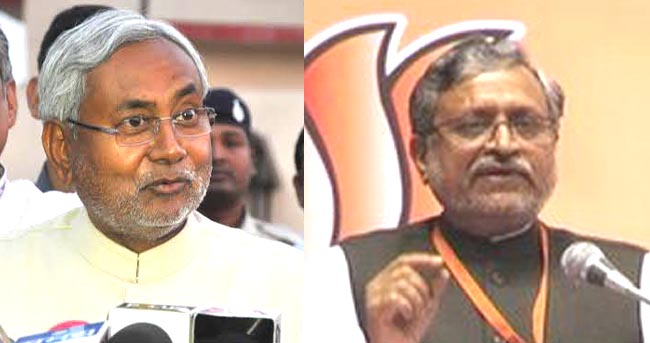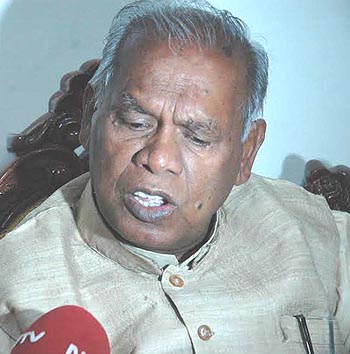|
02/08/2015 Nitish, SuMo wasting time in taking credit for development
Soroor Ahmed
|
If Nitish Kumar wants to walk away with all the credits for whatever development works the government led by him did in the last about a decade, friend-turned-rival, the BJP, instead wants to put all the blames on him for all the wrongs, which took place in the state during same period. This is a funny situation as in democracy nothing like this happens. Here a team works, and credits and blames are shared. No doubt Bihar has developed in the last about 10 years, but a state can not make progress in vacuum. Let Nitish and his former deputy Sushil Modi put up all the facts and figures to prove their points yet no one can deny the fact that whatever had happened in Bihar could never have been possible without the benevolent central government led by Manmohan Singh. It is other thing that poor propaganda machinery of the Congress party and bias media reporting denied due credit to it. Who can deny the fact that the face of the state would not have changed had the centrally sponsored schemes such as National Rural Health Mission, Pradhan Mantri Gram Sadak Yojana, Rajiv Gandhi Grameen Vidyutkaran Yojana, MNREGA etc not launched. In their absence Bihar would have still been in 20th century. Nitish Kumar-Sushil Kumar Modi team could have achieved little. It is all more difficult to decipher as to who should be given more credit––JD(U) or BJP? Who can deny the fact that following an understanding Nitish was made the CM of NDA while most of the important portfolios were allotted to the BJP ministers. So minus home, which was with Nitish himself, the BJP walked away with most of the important portfolios, be it finance, urban development and housing, tourism, health, road construction department etc. While Nitish, rather exaggeratedly, takes all credit for the development works the BJP is caught in a typical dilemma. In the first seven years it praised Nitish to the sky then once he snapped ties with the saffron party the latter started blaming him for all the wrongs in the state. The BJP is well within its right to accuse Nitish of betraying it and using Manjhi as his pawn, but when it starts indulging in the development debate it falls into its own trap. In contrast Nitish never says that the BJP ministers in his cabinet were non-performers even though some of them were so. For example, Ashwani Choubey as the health minister even called for the chopping off hands of striking doctors. On the other hand: is not it fact that four successive urban development and housing ministers belonging to the BJP were largely responsible for the present chaos in Patna. No doubt a few parks did come up, but what about the growth of the builder mafia who were allowed to violate all the rules of PMC and reduce the city into a concrete jungle. What about the problem of waterlogging and non-removal of garbage? If Parween Amanullah––even for the sake of playing to the gallery––can challenge Anant Singh, while still in the cabinet, why the tongue of these BJP ministers remained tied? The BJP is caught in a bind: how to explain the construction of Bihar Museum, conventional centre near Gandhi Maidan, new bungalows for legislators etc. Alliance partner Jitan Ram Manjhi call them as a wasteful expenditure and loot of public money by Nitish. The saffron party can not say anything as work in all of them started when they were in power. Both the BJP and JD(U) need to be told that they rode back to power in 2010 not because they build roads and bridges or distributed cycles, and improved law and order as they claim. They won because they fought unitedly. Both would have lost had Ntish snapped ties after cancelling dinner of Narendra Modi and BJP top brass on June 12, 2010. They suddenly decided to patch up after a survey showed that RJD may come to power if the two NDA constituents fight separately. Nitish failed to get his due ‘mazdoori’ (wage) as he sought in his campaign for 2014 election. UPA-II lost not because it did not undertake development works. Lalu was decimated after, as a railway minister he really did something for Bihar. They all lost because of other factors, mostly political. The collapse of alliance led to the rout of Lalu in 2005 and 2009. By then it was too late for his revival. The BJP did exceedingly well because it had stitched an alliance with JD(U) in earlier elections and with LJP and RLSP in 2014.
| |


 The BJP did just the reverse with Jitan Ram Manjhi. The party singled him out for all the criticism in the state in the first seven months of his chief ministership; and then suddenly found virtues in him and started calling him a Mahadalit victim of Nitish’s highhandedness.
The BJP did just the reverse with Jitan Ram Manjhi. The party singled him out for all the criticism in the state in the first seven months of his chief ministership; and then suddenly found virtues in him and started calling him a Mahadalit victim of Nitish’s highhandedness. 